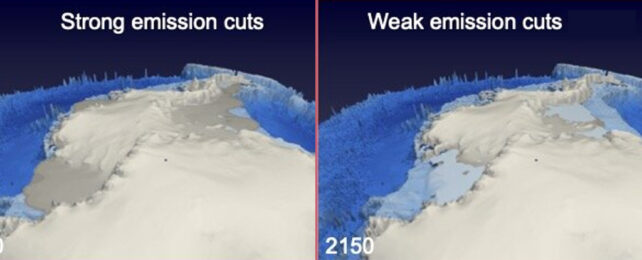Even if we manage to stabilize Earth's temperatures by peaking at 2 °C, Greenland's and Antarctica's vast ice sheets are on track for irreversible melting, a new study warns.
"If we miss this emission goal, the ice sheets will disintegrate and melt at an accelerated pace, according to our calculations," explains climate physicist Axel Timmermann from the Institute for Basic Science in Korea.
Global sea levels have already risen about 20 centimeters on average over the last century. The calculated acceleration would put one in 10 people at direct risk from rising sea levels, UN secretary-general Antonio Guterres explained at a Security Council debate in New York.
"For the hundreds of millions of people living in small island developing states and other low-lying coastal areas around the world, sea-level rise is a torrent of trouble," he said.
"We would witness a mass exodus of entire populations on a biblical scale."
By including feedback mechanisms that have been missing from previous modeling, Pusan National University climate scientist Jun Young Park and colleagues predict a major tipping point is approaching faster than expected.
"Computer models that simulate the dynamics of the ice sheets in Greenland and Antarctica often do not account for the fact that ice sheet melting will affect ocean processes, which, in turn, can feed back onto the ice sheet and the atmosphere," explains Park.
As ice on land and sea continues to thaw at increasingly rates, meltwater flowing into the ocean concentrates towards the surface, decreasing the exchange of heat from the depths and driving up temperatures of the subsurface even further. This added heat risks further eroding the frozen buttresses holding back Antarctica's ice shelf, causing even more meltwater to flow into the ocean.
While the team is yet to achieve as high a resolution as other leading climate models, including data from these processes allows researchers to see how meltwater and calving impacts the stability of ice sheets.
We're already seeing some of these effects in real time, with previously unheard of events like rain in Greenland and clearly observable increases in meltwater fluctuations on the Antarctic ice shelf, the team points out.
But Park and team's new calculations suggest this irreversible process could be triggered at just 1.8 °C.
It was only in their most aggressive mitigation scenario, keeping temperatures below 1.5 °C, that the model showed we could avoid this rapid acceleration in sea level rise.
"If we don't take any action, retreating ice sheets would continue to increase sea level by at least 100 centimeters within the next 130 years," explains Timmermann.
"This would be on top of other contributions, such as the thermal expansion of ocean water."
Such a scenario would seriously impact mega-cities on every continent, including urban centers such as Cairo, Mumbai, Shanghai, London, Los Angeles, New York, and Buenos Aires notes Guterres.
As alarming as the potential might be, there are plenty of features affecting our complex ecological systems that the new modeling hasn't included, such as the impacts of narrow coastal currents.
"It's crucial that developments such as theirs are brought into our state of the art climate models," explains atmospheric scientist Robin Smith, who was not involved in the study.
"Even though more work needs to be done to reduce the uncertainty in projections like these, this study clearly shows the importance of taking rapid action to reduce anthropogenic greenhouse gas emissions as quickly as possible to minimize the risks associated with the loss of major ice sheets."
That doesn't mean we have the luxury of waiting to find out. Every increment of warming we can avoid gives us a far better chance of helping future societies avoid the worst of a rapidly warming planet.
This research was published in Nature Communications.
